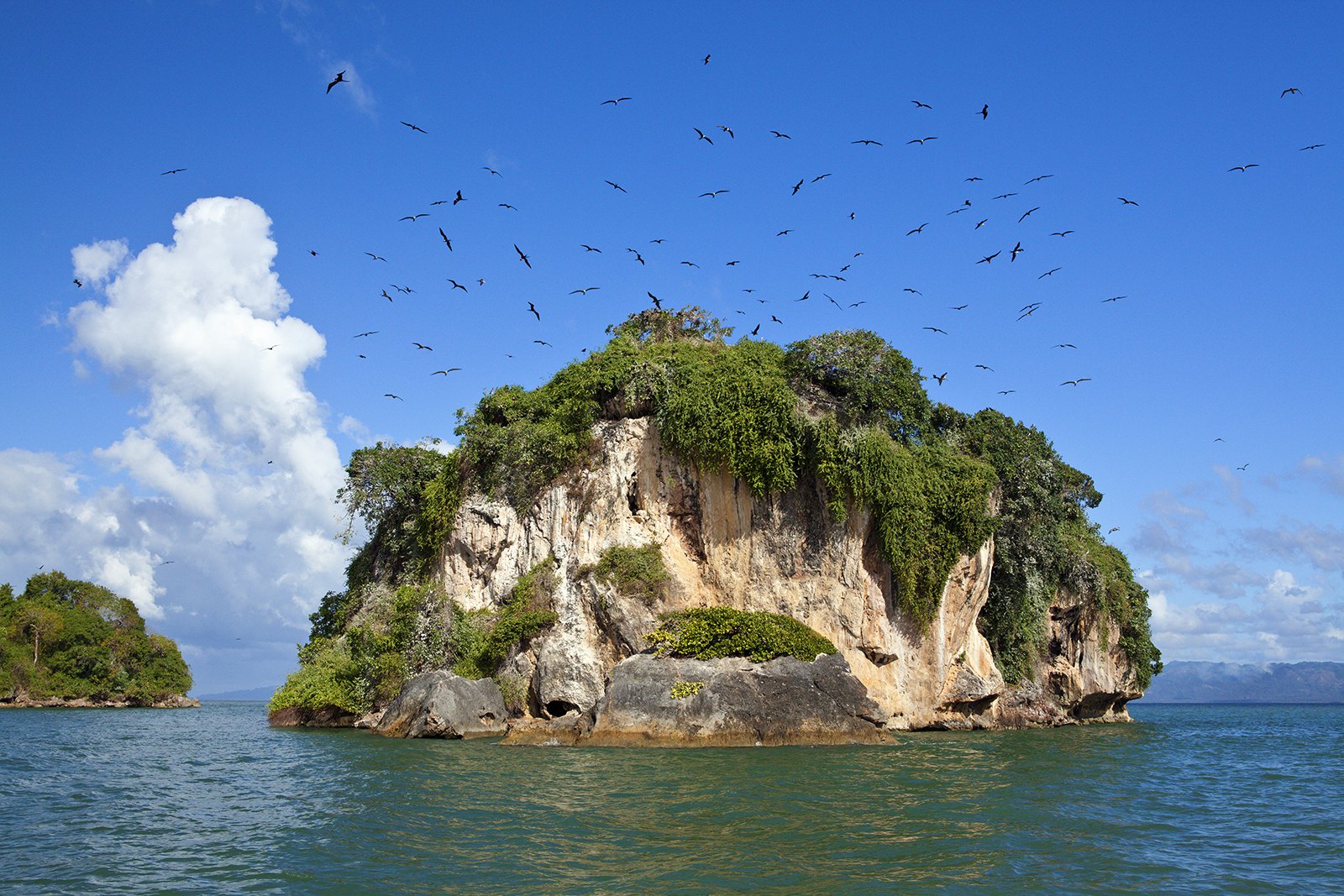

Bird Island in Los Haitises National Park © Daniela Dirscherl / Lonely Planet
The Dominican Republic is well known for its blissful beaches: the crystal clear waves of Punta Cana, the eye-catching turquoise waters at Bahía de las Águilas, and the deep blues of the Atlantic lapping at golden sands on Samaná Peninsula.
While all are fantastic stops on the island, the DR has a beating heart full of outdoor adventure, colonial and indigenous history and cool mountain breezes that often gets overlooked.
We’ve compiled a few of our favorite Dominican experiences once the sunburn forces you to retire from your ocean-side outposts, and we promise, you won’t be disappointed.

Los Haitises National Park
While technically still a water activity, a trip to Los Haitises offers more than just a day in the sun: it gives visitors a crash course in the region’s ecological and cultural history. Lined with a string of 58 small, jagged islets worn by salt, wind and rain and only navigable by boat, the national park appears almost prehistoric; yawning cave mouths gape open on several of the small islands, while massive pelicans roost on the rocks and lithe herons skim the water's surface.
Visitors can hop off their boats to explore a series of caves used by the indigenous Taíno as ceremonial grounds – carvings and pictographs cover the walls and massive stalactites dangle overhead. The park is also home to a complicated network of mangroves, and many outfitters offer kayaks so you can get a closer look. Samaná Peninsula is home to tons of hotels and businesses offering tours to the park, including Flora Tours and Escape Tours Samaná, so you won't be short on booking options.

Should you be a little farther northwest, be sure to visit to the twenty-seven waterfalls at Damajagua, where you can slip n’ slide down the rushing waters into beautiful blue-green natural pools. You must visit with a guide, and you can book a trip from several tour operators in Puerto Plata, Sosúa and Cabarete; most stop at the 7th, 12th or 27th fall, and prices vary based on how far you go. You'll find a restaurant and visitor center at the entrance to the site.
Take it to the mountaintop
If you are looking for an escape from the Caribbean heat, head to the central highlands for a breath of mountain air. Jarabacoa and Constanza are the region’s most popular stop-offs, and travelers will be rewarded with views of gorgeous green hills, flower farms, and plenty of roadside eateries selling the Dominican arepa, essentially a giant, dense corn cake. If you’re an adrenaline junkie, book a whitewater rafting or canyoning trip down the Río Yaque del Norte with the exceptional tour provider Rancho Biaguate; if you’d rather take it easy, take in the sweeping vistas of the valley from the rotating restaurant at Aroma de la Montaña or enjoy some beverages with the locals at the towns' central parks, which come alive on the weekends.

Learn your history in Santo Domingo
History buffs rejoice: Santo Domingo’s Zona Colonial is a UNESCO World Heritage site chock-full of striking, well preserved Spanish colonial architecture. Not only are the structures abundant, but these are some of the oldest European buildings in the Americas, as the island of Hispaniola (now the Dominican Republic and Haiti), was Columbus’ very first settlement.
It’s easy to take your own walking tour through the cobblestone streets to see the Catedral Primada de América, the 'New World’s' oldest operating church, the Fortaleza Ozama, its oldest colonial military structure, and the Ruinas del Hospital San Nicolás de Barí, its first hospital, plus many others. You can even stay at the Hostal Nicolás de Ovando, a lovely hotel which was actually home to the island’s first Spanish governor.

Cigar tours in Santiago
The hand-rolled Dominican cigar is an art form, and many of the world’s top brands are produced in the rolling green hills around Santiago de los Caballeros, the country’s second-oldest city. Several factories are nestled at the base of the Cordillera Septentrional in the small town of Tamboril, northeast of the city, and most offer tours. Visit La Aurora Parque Industrial to learn about the cigar-making process and snag a few stogies for yourself.
Bonus travel tip: Santiago is also home to one of the nation’s most extravagant Carnaval celebrations; lechones, colorful horned characters representing the city's neighborhoods, fill the streets along with scores of others decked out in extravagant costumes. If you are in the area during late February, be sure to stop into town to check out the festivities.
Bailey Freeman traveled to the Dominican Republic with support from the Dominican Republic Ministry of Tourism. Lonely Planet contributors do not accept freebies in exchange for positive coverage.
Article updated June 2019.














